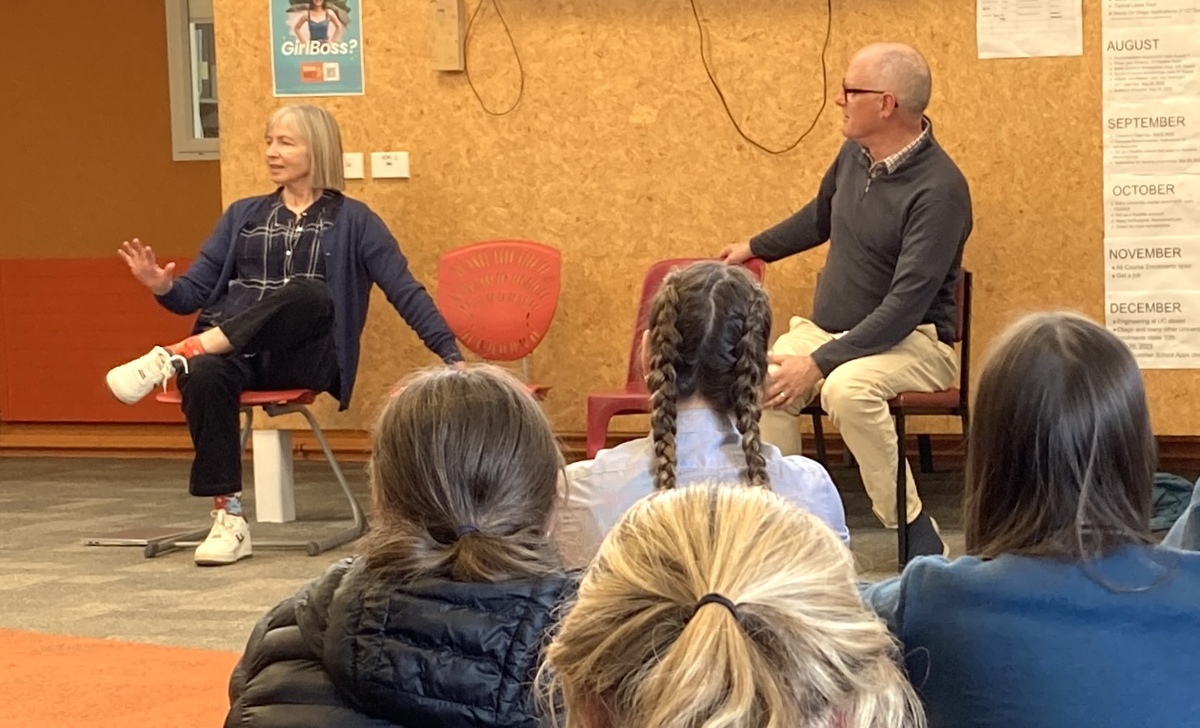Crash course on election for first time MAC voters
Sue Wards
11 October 2023, 4:00 PM
 Year 13 dean Charlotte Lucas and professor Hugh Campbell discuss election issues with year 13 students. PHOTO: Wānaka App
Year 13 dean Charlotte Lucas and professor Hugh Campbell discuss election issues with year 13 students. PHOTO: Wānaka AppTe Kura o Tititea Mt Aspiring College (MAC) year 13 students are among the thousands of New Zealanders eligible to vote for the first time in this week’s general election, and yesterday (Wednesday October 11) they were given a crash course on some of the issues.
Professor Hugh Campbell from the University of Otago sociology department spoke at the MAC year 13 meeting yesterday about the election (the final day for voting is Saturday October 14), and what made their generation so unusual.
Hugh told the students the electorate was at a “crucial moment in 21st century history”.
“The kind of place you're going to be living for your adult lives is going to be strongly influenced by the things that are happening at the moment.
“For the last 200 years politics in the western world have been dominated by the idea of growth… Most political struggles and fights were about how to manage the political direction and who could participate in setting that direction.
“Twenty-first century politics is quite different. Twenty-first century politics is where the big pro-growth narrative starts to strike some pretty hard limits at a planetary level. We’re in the ‘no longer so easy to grow’ phase in the life of the planet and decisions that are taken now will lock in some pretty serious consequences.”
“That’s why these elections now are so important.”
Hugh told the students there were two reasons why they were a very interesting group. The first was their age.
“How you act politically as young people now; you are in a starkly different place to your parents and grandparents. There has never been a time in political history in which the situation of young people is so different in terms of your political prospects than it is to older generations.”
The second issue which marked them out as interesting was they were living in one of the two most affluent communities in New Zealand, he said.
“Most of the politics in New Zealand is concentrated around issues of inequality… Inequality is not a significant issue in Wānaka… The Central Lakes area is one of the most homogeneously white places in New Zealand… Pretty much the only way in which your community is demographically typical of New Zealand is the mix between male and female.”
Hugh said one of the easiest predictors of how people vote is how their parents voted, but “that trend is breaking” as more and more young people are voting differently to their parents.
He said the three things that tend to drive people’s voting are “freedoms, fairness, and future risks”.
There are around 140 year 13 students at MAC. Of the 50 or so students at yesterday’s meeting, four students - who Hugh called “the fired up few” - said they had already voted; another 20 or so planned to vote this week; and the majority said they were not yet old enough.
Before Hugh spoke, one student told the Wānaka App she didn’t know who she would vote for; she said she hadn’t done any research about the election, and nor had her parents spoken to her about it.
Her friend said: “It’s either that [disengaged] or completely the opposite,” adding that most students were disengaged.
However during question time it was clear there was interest in election issues, and some students had thought deeply about them. Hugh responded to questions about polling trends, Winston Peters’ potential role as ‘kingmaker’, and the importance of LGBTQ+ issues in the election.
Both Hugh and year 13 dean Charlotte Lucas recommended that students check out ‘vote compass’ to measure where their views align with those of the political parties.







